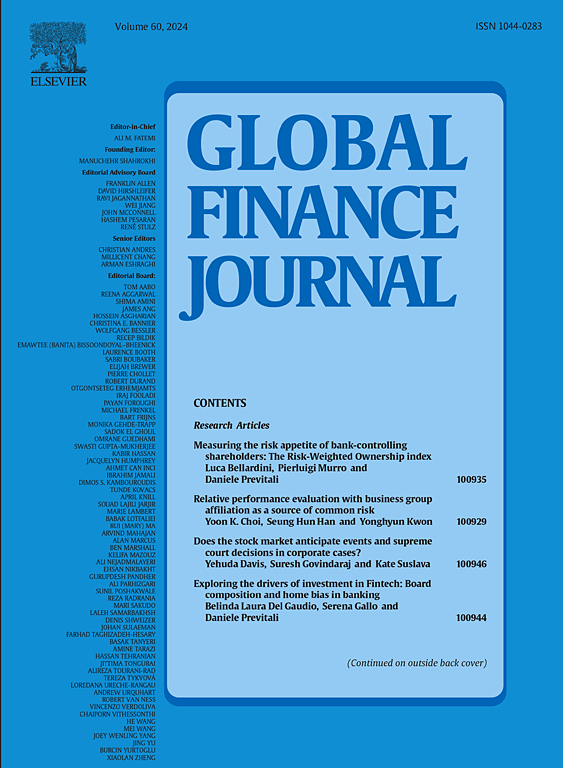Asymmetric dependency among US national financial conditions and clean energy markets
IF 5.5
2区 经济学
Q1 BUSINESS, FINANCE
引用次数: 0
Abstract
This paper examines the relationship between the US National Financial Conditions Index (NFCI) and the clean energy industry using quantile and frequency connectedness, cross-quantile, and wavelet quantile correlation (WQC) techniques. Results reveal (a) a stronger dependence between the NFCI and clean energy under bullish market states. Moreover, the total connectedness between the NFCI and clean energy mostly exhibits time-varying characteristics. In particular, clean energy has a greater spillover effect than the NFCI. (b) Dynamic frequency total connectedness at extreme quantiles provided a more comprehensive view of structural shocks in financial markets, and major crises, such as COVID-19, significantly amplified this connectedness. Overall, the WilderHill Clean Energy Index and the NASDAQ OMX Renewable Energy Index demonstrate substantial potential for hedging financial conditions. (c) The cross-quantile correlation results revealed an asymmetric dependency, demonstrating a sustained significant positive relationship between the NFCI and clean energy index (CEI) across the relative higher quantiles and middle quantiles. The WQC showed that the NFCI and specific CEIs tended to exhibit the strongest positive correlations in nonextreme quantiles and lower frequencies. These results can be of considerable interest to various financial market participants.
美国国家财政状况与清洁能源市场之间的不对称依赖关系
本文利用量级和频率关联性、交叉量级和小波量级相关性(WQC)技术研究了美国国家金融状况指数(NFCI)与清洁能源产业之间的关系。结果显示:(a)在市场看涨的状态下,NFCI 与清洁能源之间的依赖性更强。此外,NFCI 与清洁能源之间的总关联度大多呈现时变特征。特别是,清洁能源比 NFCI 具有更大的溢出效应。(b) 动态频率总关联度在极端数量级上更全面地反映了金融市场的结构性冲击,COVID-19 等重大危机显著放大了这种关联度。总体而言,怀尔德希尔清洁能源指数和纳斯达克 OMX 可再生能源指数在对冲金融状况方面具有巨大潜力。(c) 跨量值相关性结果显示了非对称依赖性,表明 NFCI 和清洁能源指数(CEI)在相对较高的量值和中间量值之间存在持续显著的正相关关系。WQC 显示,NFCI 和特定 CEI 在非极端量级和较低频率时往往表现出最强的正相关性。这些结果会引起金融市场参与者的极大兴趣。
本文章由计算机程序翻译,如有差异,请以英文原文为准。
求助全文
约1分钟内获得全文
求助全文
来源期刊

Global Finance Journal
BUSINESS, FINANCE-
CiteScore
7.30
自引率
13.50%
发文量
106
审稿时长
53 days
期刊介绍:
Global Finance Journal provides a forum for the exchange of ideas and techniques among academicians and practitioners and, thereby, advances applied research in global financial management. Global Finance Journal publishes original, creative, scholarly research that integrates theory and practice and addresses a readership in both business and academia. Articles reflecting pragmatic research are sought in areas such as financial management, investment, banking and financial services, accounting, and taxation. Global Finance Journal welcomes contributions from scholars in both the business and academic community and encourages collaborative research from this broad base worldwide.
 求助内容:
求助内容: 应助结果提醒方式:
应助结果提醒方式:


